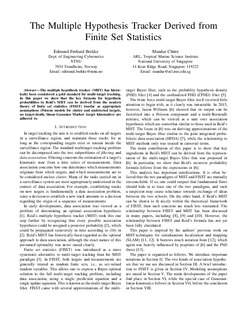| dc.contributor.author | Brekke, Edmund Førland | |
| dc.contributor.author | Chitre, Mandar | |
| dc.date.accessioned | 2017-12-01T09:49:56Z | |
| dc.date.available | 2017-12-01T09:49:56Z | |
| dc.date.created | 2017-11-30T13:28:05Z | |
| dc.date.issued | 2017 | |
| dc.identifier.isbn | 978-0-9964-5270-0 | |
| dc.identifier.uri | http://hdl.handle.net/11250/2468710 | |
| dc.description.abstract | The multiple hypothesis tracker (MHT) has historically been considered a gold standard for multi-target tracking. In this paper we show that the key formula for hypothesis probabilities in Reid's MHT can be derived from the modern theory of finite set statistics (FISST) insofar as appropriate assumptions (Poisson models for clutter and undetected targets, no target-death, linear-Gaussian Markov target kinematics) are adhered to. | nb_NO |
| dc.language.iso | eng | nb_NO |
| dc.publisher | Institute of Electrical and Electronics Engineers (IEEE) | nb_NO |
| dc.relation.ispartof | 2017 20th International Conference on Information Fusion | |
| dc.title | The multiple hypothesis tracker derived from finite set statistics | nb_NO |
| dc.type | Chapter | nb_NO |
| dc.description.version | submittedVersion | nb_NO |
| dc.identifier.doi | 10.23919/ICIF.2017.8009708 | |
| dc.identifier.cristin | 1520909 | |
| dc.description.localcode | © 2017 IEEE. Personal use of this material is permitted. Permission from IEEE must be obtained for all other uses, in any current or future media, including reprinting/republishing this material for advertising or promotional purposes, creating new collective works, for resale or redistribution to servers or lists, or reuse of any copyrighted component of this work in other works. | nb_NO |
| cristin.unitcode | 194,63,25,0 | |
| cristin.unitname | Institutt for teknisk kybernetikk | |
| cristin.ispublished | true | |
| cristin.fulltext | preprint | |
| cristin.qualitycode | 1 | |
